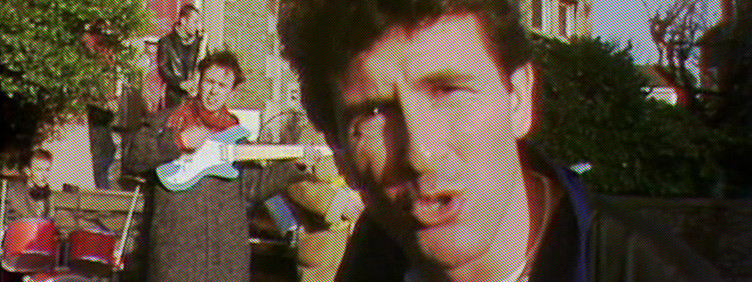
Previously on Dirty Feed, I took an in-depth look at the music used in Series 1 of The Young Ones. This turned out to be a surprisingly popular move. So, how about Series 2?
No preamble, let’s get on with it. Only pop music can save us now…
As before, there are some tracks that I just haven’t been able to identify yet. If you have any ideas, let me know in the comments or elsewhere.
S2E1: Bambi
RX: 14th/15th February 1984 • TX: 8th May 1984
What better way to kick off this article than with an annoyingly troublesome episode? Even with access to the paperwork, a number of things in “Bambi” involve joining the dots in what is hopefully the correct way. I’ve highlighted the places where I’ve had to take a slight leap of faith.
(7:55) / (8:34) / (15:15) Three stings, probably Brewis
Just before the matchbox says he’s irrelevant, as Robbie Coltrane balances his eclair, and as Neil reveals the gang has been picked to appear on University Challenge. I say “probably Brewis” because these aren’t actually mentioned in the official paperwork, but from the sound of them I’d be amazed if they weren’t his.
(8:08) As we take our first visit to the doctor watching the episode’s events under a microscope, the following music plays:
This isn’t listed on the paperwork at all. Does anybody recognise it?
(15:19) “Ace of Spades”, Motörhead
“Music!” As usual with these performances, the band isn’t actually miming to the single version, although it sounds extremely close to it. The single was actually released a full four years previously and featured Eddie Clarke; by the time this episode was recorded, Würzel and Phil Campbell had replaced him.
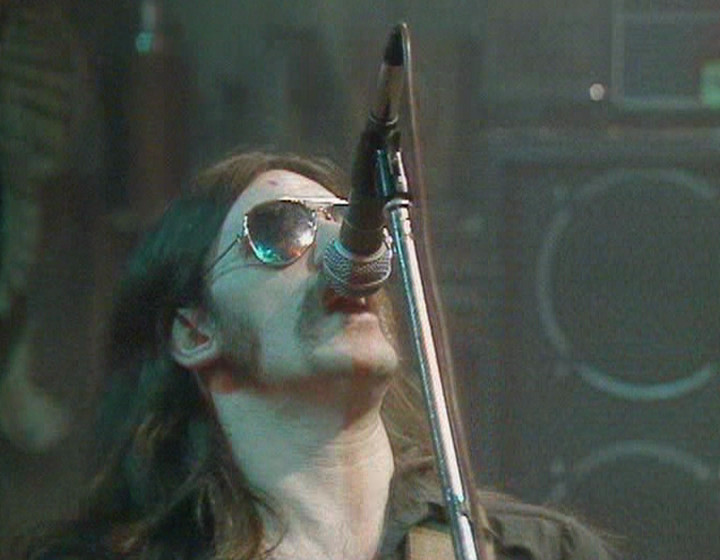
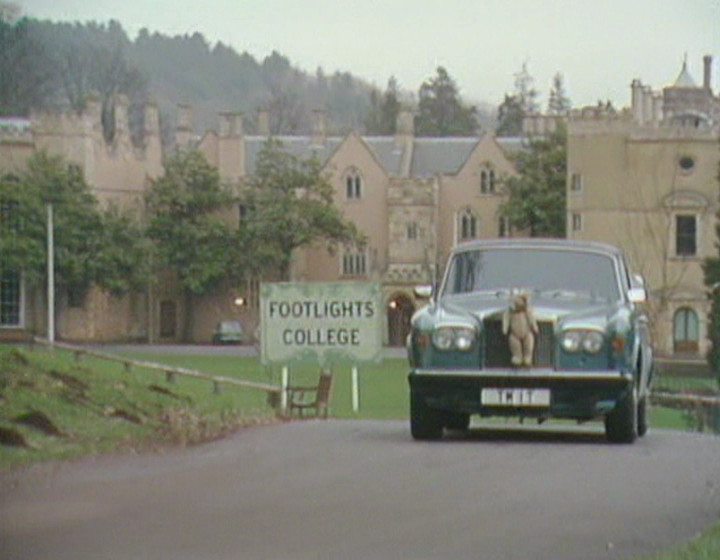
(24:54) “University Challenge Incidental”, Peter Brewis & Orchestra
When we first see the Footlights College gang being driven to the studio in the Rolls1, a rather pompous bit of music plays. It took a bit of working out, but I believe this is a Brewis creation, as listed in the paperwork.
Now, “University Challenge Incidental” is a fairly generic name for this music, so you may be wondering – how do I know this doesn’t refer to the unknown piece of music used during the microscope scene above? In fact, I don’t think we know, but there’s two bits of circumstantial evidence.
- Firstly, the music is listed as 10″ in duration in the paperwork, which pretty much matches the episode; the microscope music is slightly shorter.
- Secondly, the music is listed in the paperwork in the correct place; after “Ace of Spades”, but before the University Challenge music proper.
Neither of these things would prove much on their own – paperwork can be unreliable – but when taken together, I think it’s highly likely it refers to this particular piece of music.
My only other question, then, is: why? The Young Ones doesn’t really have much of this kind of incidental music elsewhere in the show. It’s a little odd that it features here.
(29:11) “College Boy”, Peter Brewis & Orchestra
The actual University Challenge theme, of course – but the paperwork helpfully tells us that this isn’t the version used in the real show, but is a re-recording by Brewis. (You have to wonder why, as his recording is very similar to the original. Rights issues?)
(33:51) “The Young Ones Closing”, Peter Brewis & Orchestra
The standard closing music, with 5″ of University Challenge-esque music tacked onto the front. This is listed as 55″ in the paperwork; the rest of the series has the closing music listed as 50″ or 51″, so this all matches up nicely.
S2E2: Cash
RX: 30th/31st January 1984 • TX: 15th May 1984
(00:35) “Move It”, Cliff Richard
Cliff’s debut single from 1958, playing on Rick’s record player just before it’s nicked and thrown on the fire. (This is the first time we actually see Rick listening to some Cliff Richard, incidentally.)
(13:41) “At the Sign of the Swinging Cymbal”, Brass Incorporated
For the cutaway to Fluff. The 1970 Brass Incorporated version as used for Pick of the Pops at the time, not the original Brian Fahey version.
(14:08) Now, this is a very interesting one. This music is used for the ghosts wandering through the living room listening to a ghetto blaster:
This music is supposedly listed on the paperwork: “Funky Feeling”, on the album Disco Happening from the Bruton music library. But if you actually listen to it, it quickly becomes clear that the paperwork is incorrect, and that music isn’t used here at all. For a start, there are vocals in the piece used in the episode.
So, I’ll throw it out to you lot: does anybody recognise it? Surely the vocals should give somebody a clue?
(19:09) “Subterranean Homesick Blues”, Ken Bishop’s Nice Twelve
With Ken Bishop’s Nice Twelve, consisting of Peter Brewis, Simon Brint, Stewart Copeland, Chris Difford, Martin Dobson, Derek Griffiths, Jools Holland, and yer actual Rowland Rivron. I’ll take them over Dylan any day.
This was cut from the first DVD release in the UK, despite being present and correct on the VHS double-pack release. Oddly enough, they actually bothered to edit the end credits sequence to remove the group’s names, in a vaguely awkward fashion:
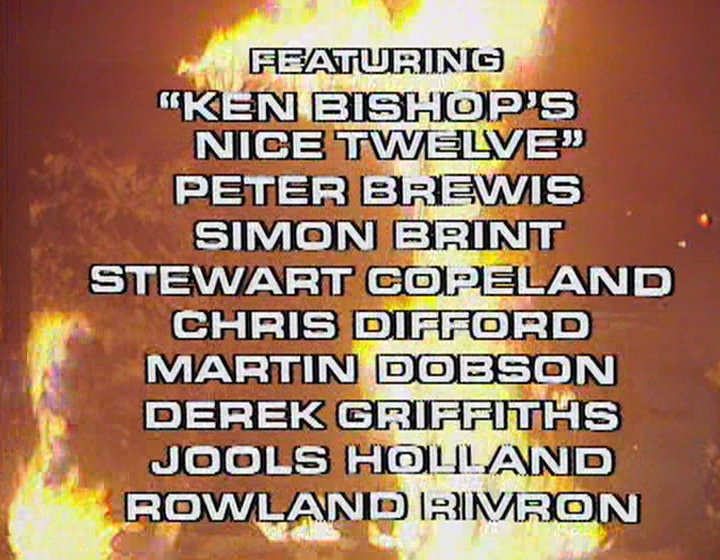
Broadcast episode
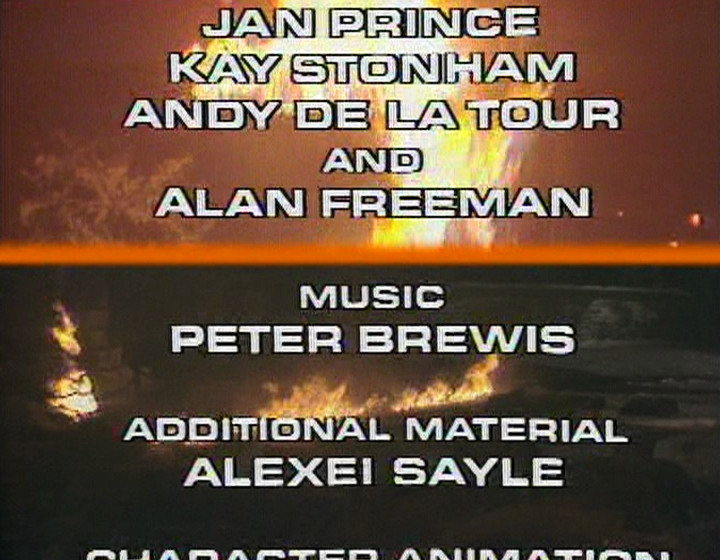
Edited DVD release
The latest DVD release restores the sequence entirely.
(23:56) “El Duce Eurovision Song”, Peter Brewis & Orchestra
He really does make some stupid noises. Credited entirely to Brewis in the paperwork, which is mildly odd. Surely Alexei wrote at least some of the lyrics?
(26:47) “Electrick Gypsies”, Steve Hillage
“Oh no. Steve Hillage.” Playing at the party Neil breaks up. From the 1976 album L.
S2E3: Nasty
RX: 6th/7th February 1984 • TX: 29th May 1984
(00:20) “The Young Ones Horror Titles”, Peter Brewis & Orchestra
A beautiful Hammer pastiche by Brewis. (God, I love the opening to “Nasty”. It’s the the kind of thing which could have been so easily done on the cheap. Generic horror library track, pasted-together stills. But no, they did it properly.)
(21:26) / (22:27) “Botany Bay Sea Shanty”, Peter Brewis & Orchestra
As we go into and out of the convict ship sketch, a custom piece of Brewis for your delectation, as detailed in the paperwork.
(24:39) “Comedy Cues – Comic”, Dave Richmond
A peculiar use of an existing KPM library track. For years, I’d assumed that the silly jingle at the end of the Painaway advert was Brewis, but in fact it comes from the 1974 KPM album Links, Bridges & Stings – Side 2, Track 10, to be precise. Obviously, The Young Ones added the vocal – but what a fabulous use of a library track, with the three-note “Pain-a-way” neatly being reflected in an already existing piece of music.
It’s worth noting that not all of the existing track was used in the episode; you can hear the full version here, along with the similar Track 11.
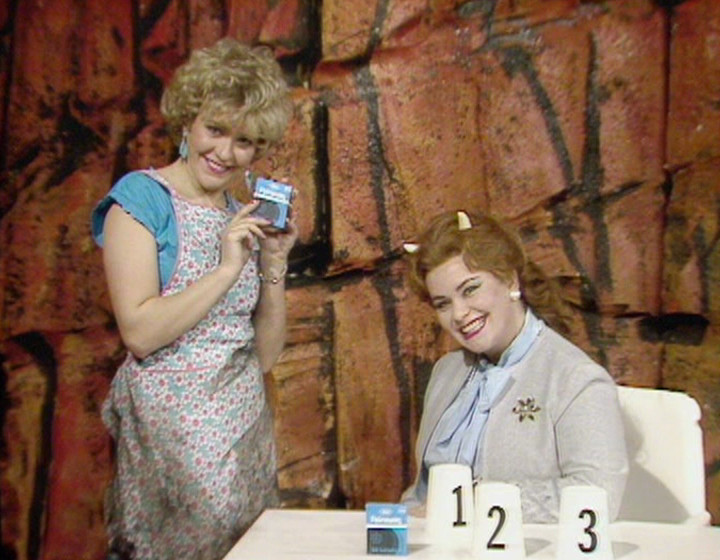
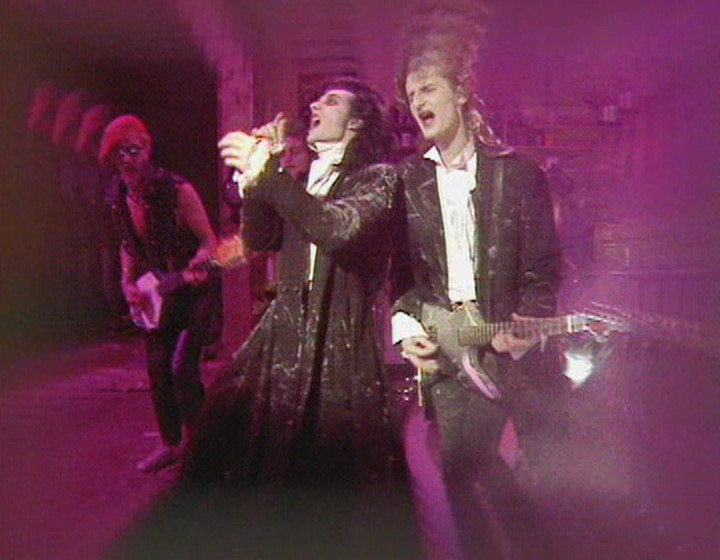
(25:11) “Nasty”, The Damned
Ah, The Damned – the only group ever to write a song especially for performing on The Young Ones. Fantastic. The version used in the episode is the exact same recording as released as the B-side on the single “Thanks for the Night”, and on their compilations such as Best Of Oddities & Versions.2 You really don’t want to know how many times I had to listen to the song in order to confirm the above.
Two other things of note. Firstly, the Young Ones paperwork reveals the original name for the song: “Driller Killer”. Secondly, a note on Discogs states that the song was recorded on the 19th January 1984; two and a half weeks before the Young Ones studio recording. Do what you see fit with this information. (I just got an erection, myself.)
(34:02) “The Young Ones Closing”, Peter Brewis & Orchestra
Despite the fact that the episode ends with Brewis’s horror theme, as usual the paperwork doesn’t note that the closing music is unique to the episode. I find this inexplicably frustrating.
S2E4: Time
RX: 19th/20th April 1984 • TX: 5th June 1984
(0:00) “Dallas Opening”, Peter Brewis & Orchestra
One of the best things Brewis ever did for the series. Oddly enough, however, it actually has its origins in a piece of music he wrote three years earlier for the show: the title theme from the unbroadcast edit of the pilot contains many elements which eventually ended up being used here. Hey, why waste something brilliant?
(1:15) / (2:08) Dallas Stings, probably Brewis
After the teeth glinting, and ET reveal. Not mentioned anywhere on the paperwork, but these link in so clearly with the Dallas opening that they surely have to be Brewis.
(15:10) / (16:27) / (17:14) “Introit Puer natus est”, Gregorian Chant Vol III No 1 (Christmas)
The chanting coming out of the radio that Rick attempts to dance to. Tracking this piece of music down turned into a whole article of its own. Please read it, and consider the hell that is my life.
(16:52) “Capt Blood Radio Jingle”, Peter Brewis & Orchestra
Another ridiculous Brewis creation, as detailed in the paperwork. The gunshot sounds are particularly amusing.
(19:34) A rather tense piece of music as Helen Mucus picks up the knife and advances on the radio, unlisted in the paperwork:
A Brewis creation, or existing library music?
(21:12) “Moonlight Romance”, Amazulu
“Oh, is that right? I’m a Glaswegian.” As usual, not the exact version released as a single, although a vaguely close approximation once you get past the intro. Incidentally, the single was actually released four months after this episode was broadcast, in October 1984. You’d think they’d want it timed slightly better than that, but then I am not a record company executive.
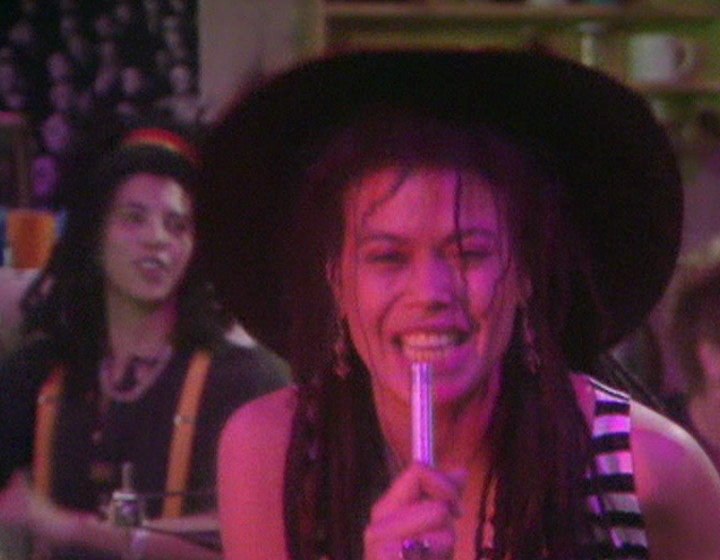
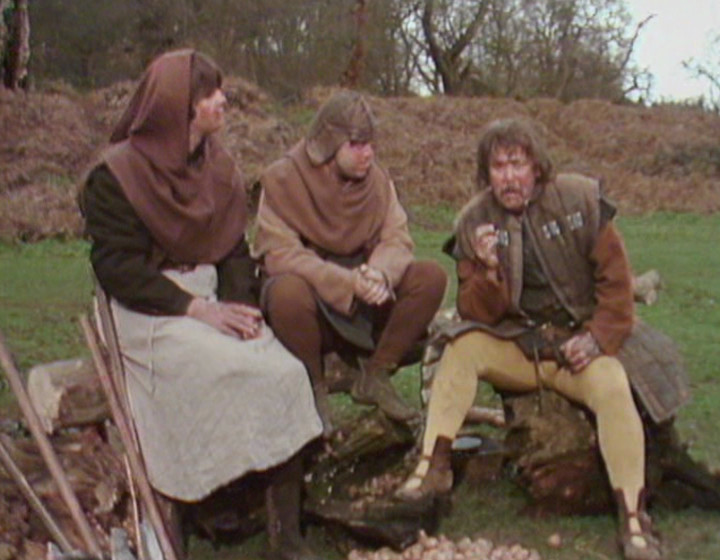
(27:25) “Greensleeves”, Jack Shaindlin
As we join the medieval peasants betting on leg amputation. This was released on the 1974 Cinemusic album Minute Miniatures/Guitar On The Spot, which is detailed in the paperwork… but not on the sheet for “Time”. Instead, it’s listed in both “Sick” and “Summer Holiday”, despite appearing in neither episode. Brilliant.
(Annoyingly enough, a copy of this album has proved difficult to track down so far; I haven’t actually heard this track to confirm the above. It’s very likely to be correct, however; everything appears to match.)
(29:58) “Panic”, Peter Brewis & Orchestra
The fast version of the end theme, as the gang prepare to hang Neil. A bit of playing around with Audacity indicates that this genuinely is the end theme sped up, rather than a separate piece of music – albeit an edited version. (This isn’t listed in the paperwork to “Time”, but is listed for “Summer Holiday”, and “Panic” is the official title.)
(30:42) Nothing listed in the paperwork for the music used in Jester Balowski’s Medieval Torture Hour:
To me, this smacks of Brewis. But if anybody recognises it from elsewhere, let me know.
S2E5: Sick
RX: 23rd/24th January 1984 • TX: 12th June 1984
(0:41) “Twist and Shout”, Brian Poole and the Tremeloes
Yes, the 1963 Tremeloes version, as listed on the paperwork. It’s easy to forget how much actual 60s music there is in the show until you start listing it.
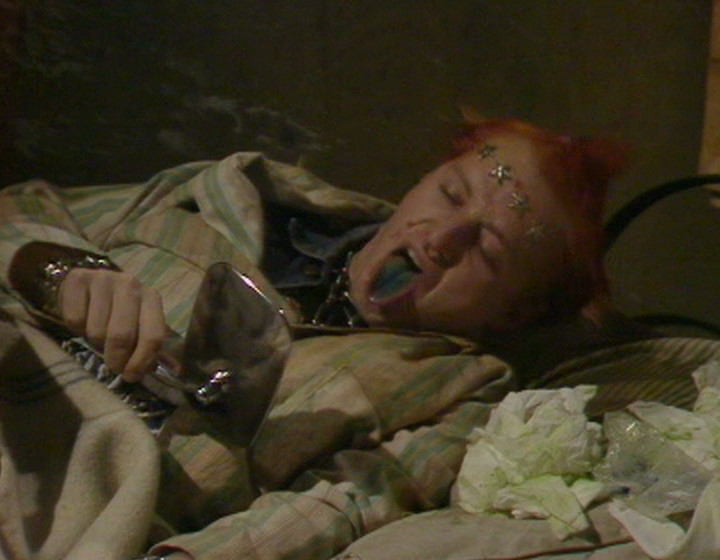
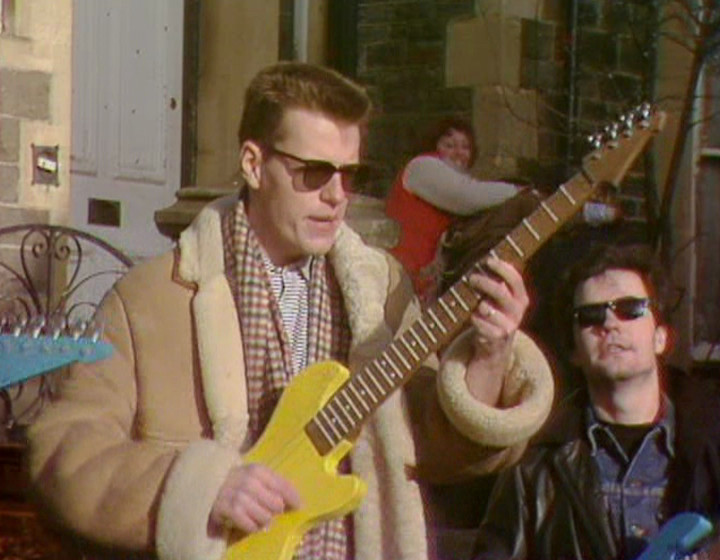
(8:12) “Our House”, Madness
“Now it’s exactly this kind of communal street life that the high-rise block is destroying.” Like in “Boring”, the actual single version is used here. (Which had been released nearly two years before the episode aired.)
(18:01) “Panic”, Peter Brewis & Orchestra
The fast version of the end theme, as per the previous episode. This time it’s the full end theme rather than an edited version, though.
(23:02) “Good Life Titles”, Burt Rhodes
Yer actual, real theme to The Good Life. Which makes sense. But hilariously…
(25:34) / (29:31) / (30:38) “Good Life Stings”, Peter Brewis & Orchestra
…the silly parody sitcom stings in the last five minutes of the show are a Brewis creation, and officially called “Good Life Stings” on the paperwork. Brilliant.
(33:42) “Young Ones Closing Music”, Peter Brewis & Orchestra
A game show style end theme to celebrate Neil’s parents, leading into a shortened version of the main Young Ones end credits. This is credited to Brewis on the paperwork with the correct duration, but as usual doesn’t give a more specific title to distinguish it from the standard music. Why not “Entertainment Young Ones Closing”, or something? I HATE EVERYBODY INVOLVED IN MAKING THE YOUNG ONES.
S2E6: Summer Holiday
RX: 24th/25th April 1984 • TX: 19th June 1984
It somehow seems suitable that the final episode of The Young Ones contains an awful lot of music. Perhaps more than any other episode aside from “Interesting”. Lots to get through here.
(3:43) “Funky Feeling”, Miki Antony
Oh, hello there. Remember the music which was listed in the paperwork for the ghosts in “Cash”, which turned out to be incorrect? It’s actually the music used for the ant disco here – correctly listed in the paperwork this time. From the 1975 album Disco Happening, appropriately. You can listen to the full track here.
Yes, ascertaining this involved listening to four seconds of muffled disco beat with dialogue obscuring it over and over again until I was confident that it was correct. My life is great.
(4:51) “Chase Sequence”, Don Banks
For the main bit of Neil’s transformation into The Hulk, this is taken from the 1976 Conroy library album Drama – Tension. Oddly – but brilliantly – the entire album is on Spotify, and can be listened to here. The track is listed incorrectly in the paperwork, which states “Tension Background” from the same album instead. Helpful.3
The original provenance of this track is even more complicated. Remember my examination of a library track used in some Trev and Simon sketches? “Chase Sequence” can similarly be tracked back to its use in the film Mark of the Devil Part II in 1973… but after that, the trail goes cold. Whether it was written for the film, or was an existing library track like the Trev and Simon example, I have no idea.4
There’s one further complication. I wouldn’t be doing my job if I didn’t note that Neil’s transformation is actually bookended by two stings which I haven’t been able to track down. Here’s the full section – “Chase Sequence” is the long bit in the middle, but the very beginning and end are not part of that track:
To be honest, those two noises blur the line between music and sound effects, but I thought it was worth mentioning.
(6:10) And while we’re on unidentified music: it’s Neil’s bedroom, and Roger Sloman is indulging in some of his patented subtle acting. But what’s this sting in the middle of it?
As with much of the unidentified music in Series 2, I would be very, very willing to bet that this is Brewis.
(9:55) “Time Lapse”, Peter Brewis & Orchestra
As Rick is attempting to play Botticelli and Mike drifts off, as listed in the paperwork.
(13:09) “Stop in the Name of Love”, Peter Brewis & Orchestra
Yes, as Elephant Head comes on and starts dancing, it is not the famous Diana Ross version of the song which appears. Nor is a cheapo soundalike from an existing album. Instead – and slightly bizarrely – it’s actually a Peter Brewis soundalike, as detailed in the paperwork. And as it’s in the paperwork, we know for a fact that it was like this on original transmission, not pasted on for commercial releases. Odd. Presumably rights issues precluded the use of the original?
(14:14) “Hawk Lager Ad”, Peter Brewis & Orchestra
Of course. Stay witty and sexist to the bottom of the glass.
(15:37) “God Save the Queen”, TBC
As Neil turns on the television at his pathetic party. Buried away in the last part of this article, I feel free to admit that feverish work is going on behind-the-scenes to identify the exact record used, but so far we haven’t 100% got there yet. Please keep refreshing this article once per day until you are rewarded.
(20:54) “At the Sign of the Swinging Cymbal”, Brass Incorporated
More Fluff, as per “Cash”.
(21:28) “Body Talk”, John Otway
“I’ll bloody well make his body talk in a minute.” From his 1980 album Way & Bar, though this is of course a live version in the studio.
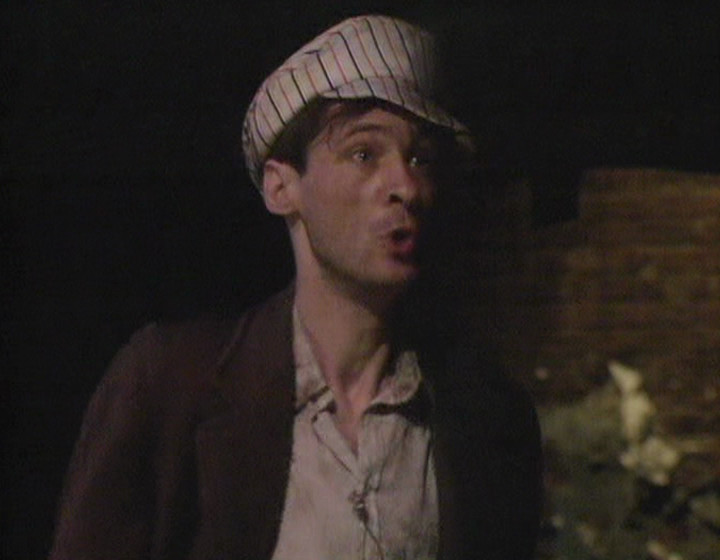
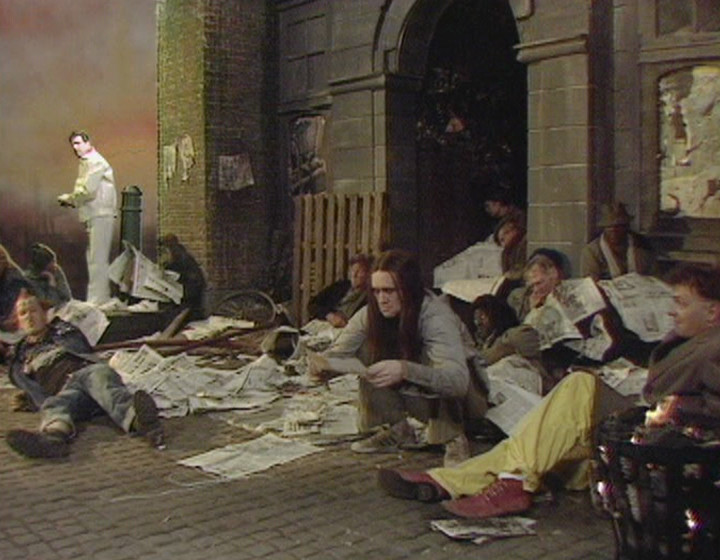
(26:02) “Gone with the Wind”, Peter Brewis & Orchestra
Hmmmmm. Bear with me. This gets confusing. Clearly, the show is doing a parody of this famous scene from Gone with the Wind. But where is the music from?
Listening to the film soundtrack, the notes don’t seem to match; it seems very much like Brewis has done a legally-distinct parody of that kind of music. But if you examine the paperwork, there’s an additional complication; the performance is credited to Brewis, but the writing credits are for Magidson/Wrubel. This was for a song called “Gone with the Wind” written in 1937, published a year after the novel, and nothing to do with the 1939 film at all. But if you listen to the song, it doesn’t sound anything like the Brewis piece.
In other words: I think Brewis was writing a parody of the film soundtrack, and this is nothing to with the 1937 song at all. The paperwork is just confused and incorrect, and not for the first time. But if anybody has any further suggestions, let me know.
(26:35) Dallas Sting, probably Brewis
The same sting which featured in the Dallas parody in “Time”, now used over the establisher of the Fascist Pig Bank. (Which is an amusing parallel.) As with “Time”, there’s no written evidence that this is Brewis, but I’d be amazed if it wasn’t.
(30:36) “Panic”, Peter Brewis & Orchestra
The sped-up version of the main theme, as per “Time” and “Sick”.
(31:38) For SPG’s tragic, SENSELESS death, we get some bagpipes music:
This is unidentified in the paperwork, and I think it will remain unidentified forever. Now there’s a challenge.
(32:09) “Summer Holiday”, 4 principals
PAY ATTENTION TO THE ROAD VYV, YOU STUPID BASTARD
(34:06) “Young Ones Closing”, Peter Brewis & Orchestra
For the fourth time this series, the end credits music is different. And for the fourth time this series, the paperwork doesn’t give it an unique title. It does reveal a brand new fact, however: it’s Kate Robbins doing the vocals! And that’s surely a brilliant revelation on which to end on.
* * *
So as the flames die down and the bodies of our heroes lie incinerated at the bottom of a quarry, it’s worth pondering what we’ve learnt over these past two articles. Because yes, I get a kick out of knowing which obscure library track plays when Rick’s bedroom is turned into a roller disco, and if you got to the bottom of this article and are reading these words right now, I’m sure you do as well.
But the thing that really struck me about the show during the writing of these pieces: how rich it is. How absolutely dense with stuff, with allusions and references. The whole reason these pieces were worth writing in the first place is because of the incredibly wide range of music in the shows, well beyond the often talked about band of the week.
Which means that when you’re constantly watching the 12 episodes over and over again, like I’ve had to for these articles, they never get boring. Because there’s always something new to spot, something new to discover, a rabbit hole to go down, even a new joke that never struck you before. No wonder the show did well on VHS. To only watch it once would be an incredible waste. Nearly four decades on, there’s still brand new things to find.
The Young Ones. Great, innit?
With thanks to Al Dupres, Tanya Jones, Darrell Maclaine-Jones, Simon Mclean, and Mike Scott.
UPDATE (15/11/20): Article corrected to point out that “Subterranean Homesick Blues” was present on the VHS double-pack release.
My partner wants you to all know it’s a Silver Shadow. Thank you, dear. ↩
Incidentally, it is incredibly irritating that their compilation The Chaos Years: Rare & Unreleased 1977-1982 contains “Nasty”… from 1984. ↩
Fun fact: I actually figured out what the correct track was here by using Shazam. Often that won’t work for this kind of project – there isn’t enough unobscured music to get a result, or it just doesn’t recognise a lot of obscure library tracks – but surprisingly, it identified the track here. Many thanks to Andrew Screen for the tip, as I never would have thought to try it for this kind of music. ↩
Incidentally, now you know why I wrote that Trev and Simon piece – I found out all that information during research for the article you are reading now. Researching library music leads you down endless rabbit holes, where you link together things that you never thought would be related in a million years. ↩

5 comments
Billy Smart on 15 November 2020 @ 4pm
Pedantic point: “the oldest song in contemporary terms to appear as a main musical performance in an episode” might better be phrased “the oldest recording”. ‘Subterranean Homesick Blues’ would be the oldest actual song.
Supportive point: Well done, John! This is great work. The thing that I take away from this most is how instrumental Peter Brewis’ contributions were to the distinctive sound of the programme.
John Hoare on 17 November 2020 @ 2pm
Cheers Billy! And yes, absolutely agreed. If anything, Brewis was even more essential to S2 than S1.
I’ve already deleted that line, because I realised it was incorrect – Body Talk is also as old as Ace of Spades anyway. So consider this comment an acknowledgement of another edit, rather than just silently deleting something.
Gareth Randall on 19 November 2020 @ 11pm
You’re likely correct in surmising that Peter Brewis had to re-record Stop In The Name of Love for rights reasons. Miming to someone else’s recording of a song requires a specific type of clearance, it’s not covered under the usual blanket the BBC would have been using for all the other background music. I ran up against this myself years ago in respect of Frank Skinner and a Chemical Brothers track.
Steve Potz-Rayner on 26 February 2025 @ 8pm
Are you missing a big chunk of the first 4 episodes here? Amaziulu wasn’t Bambi, that was famously Motorhead.
John J. Hoare on 26 February 2025 @ 9pm
Thank you so much – there were some malformed audio tags from a bad attempt at changing how the audio embeds worked a while back, and it was cutting out a huge chunk of the article. I’ve just corrected them all, so it should all be fixed now.
One word of warning – there’s a fair amount of this (and the Series 1 article) which needs rewriting. In particular, a lot of my “Is this Brewis?” questions need rewriting to “This is Brewis” statements. I’ll try and get round to it this year…
Comments on this post are now closed.